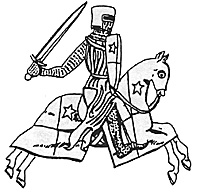 There are two types of knights.
There are two types of knights.
- 1) NAMED KNIGHT... A known noble or landowner, presumed to have better amour, horse, weapons and support. Classed as +2
2) UN-NAMED KNIGHT... An outsider... These are cheaper to use as you only lose the money if one is killed. Some armour, horse and a knowledge of arms. Classed as +1.
If an actual Ruler/Player takes part, +1 to the above (no.1) for even if he's old and fat he can bribe an edge over his foe, or at least buy better equipment.
If a knight has won a known Tournament (A CHAMPION) then he is a 'pro' and adds an additional +3 to his rating.
If a knight has fought and lived through a Tournament give him a +1 (A REGULAR).
In the case of a DRAW the knight on or nearest his homeland wins that round. This takes into account the 'home favourite' amongst the judges and spectators.
ENTRY COSTS
- NAMED KNIGHT: 3D Cheap, but you lose a noble if killed.
UN-NAMED: 5D Pricey, but less chance of dying or winning
RESULTS
If difference between two combatants is 6 then loser dies. (Broke neck in fall, ran over by horse, dirty play, very good game, bad luck etc.)
NOTE. This covers most things for a quick life-like outcome; in a sport which in itself was as un-rigged and honest as British wrestling is now.
COMBAT
This is best illustrated through example...
SPAIN (The Black Knight)
Enters a 5D Un-named called Roger at +1
He's fought before in France so he gets another +1 = +2
DENMARK enters its Duke (THE RULER), so
Enters a 3D named knight at +2
For being a ruler (PLAYER) +1
Not taken part in tournaments 0 = +3
BATTLE
Roll two dice for Roger (Roll is 5 plus his +2 = 7)
Roll two dice for Duke (Roll is 8 plus his +3 = 11)
Difference of 4. Duke wins but Roger lives to fight another day
One stage further...
Duke of Denmark (+3) fights
The Champion of Paris [A Named Knight +2 and a Champion +3 = +5]
Dice roll
Duke= 10+3= 13
Champion 6 + 5 = 11
Lucky Duke wins again, Ex-Champ lives on.
See: Simple and easy.
Two dice are needed and you can add +1 or -1 for age or sex (?) of the knight entered or just +1 for previous success / toss in tournaments.
If a noble is killed in an honest game, is it War or a sad but fair loss?
Back to The Gauntlet No. 3 Table of Contents
Back to The Gauntlet List of Issues
Back to Master Magazine List
© Copyright 1995 by Craig Martelle Publications
This article appears in MagWeb.com (Magazine Web) on the Internet World Wide Web.
Other articles from military history and related magazines are available at http://www.magweb.com